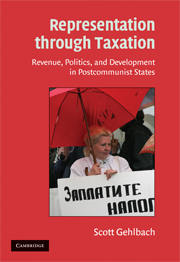Book contents
- Frontmatter
- Contents
- List of Tables
- List of Figures
- Acknowledgments
- Note on Transliteration
- 1 TAXES, REPRESENTATION, AND ECONOMIC DEVELOPMENT IN THE RUSSIAN HEARTLAND
- 2 THE CREATION OF TAX SYSTEMS
- 3 THE LOGIC OF REPRESENTATION THROUGH TAXATION
- 4 PATTERNS OF COLLECTIVE-GOODS PROVISION
- 5 REVENUE TRAPS
- 6 CONCLUSIONS
- Bibliography
- Author Index
- Subject Index
- Titles in the series
2 - THE CREATION OF TAX SYSTEMS
Published online by Cambridge University Press: 31 August 2009
- Frontmatter
- Contents
- List of Tables
- List of Figures
- Acknowledgments
- Note on Transliteration
- 1 TAXES, REPRESENTATION, AND ECONOMIC DEVELOPMENT IN THE RUSSIAN HEARTLAND
- 2 THE CREATION OF TAX SYSTEMS
- 3 THE LOGIC OF REPRESENTATION THROUGH TAXATION
- 4 PATTERNS OF COLLECTIVE-GOODS PROVISION
- 5 REVENUE TRAPS
- 6 CONCLUSIONS
- Bibliography
- Author Index
- Subject Index
- Titles in the series
Summary
Communism was the first truly totalitarian system, with the tentacles of the state stretching into corners of society hitherto reserved to private actors. Yet the communist state was structured for the society that it created, one organized around bureaucratic coordination and state ownership of the means of production. One of the paradoxes of postcommunism is that the withdrawal of the state from direct control and ownership of the economy therefore necessitated the creation of state structures unnecessary under communism. Nowhere was this more evident than with taxation, the very foundation of state authority. Laying claim to funds to run the state was largely an accounting matter when most productive assets were state owned. But with privatization and liberalization, bureaucracies had to be created to locate and encourage the transfer of what was now possessed by private actors.
Postcommunist states went about the task of creating tax systems in different ways during the 1990s. Roughly speaking, the non-Baltic states of the former Soviet Union (the countries of the Commonwealth of Independent States, or CIS) developed systems that continued to rely, as under communism, on enterprise taxation and taxes on goods and services. In contrast, the tax systems that emerged in Eastern Europe and the Baltics mirrored those of the European Union, with a greater emphasis on direct taxation of individuals.
- Type
- Chapter
- Information
- Representation through TaxationRevenue, Politics, and Development in Postcommunist States, pp. 20 - 59Publisher: Cambridge University PressPrint publication year: 2008



